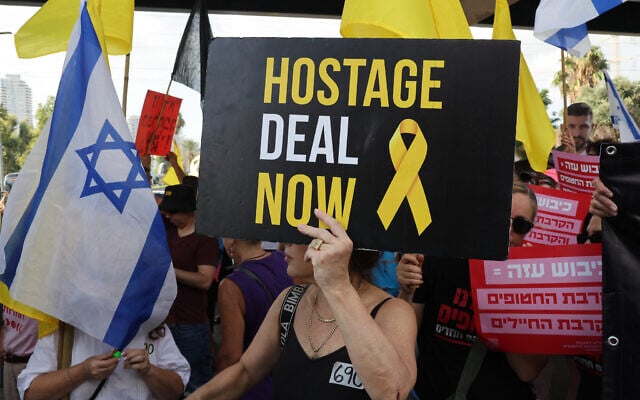


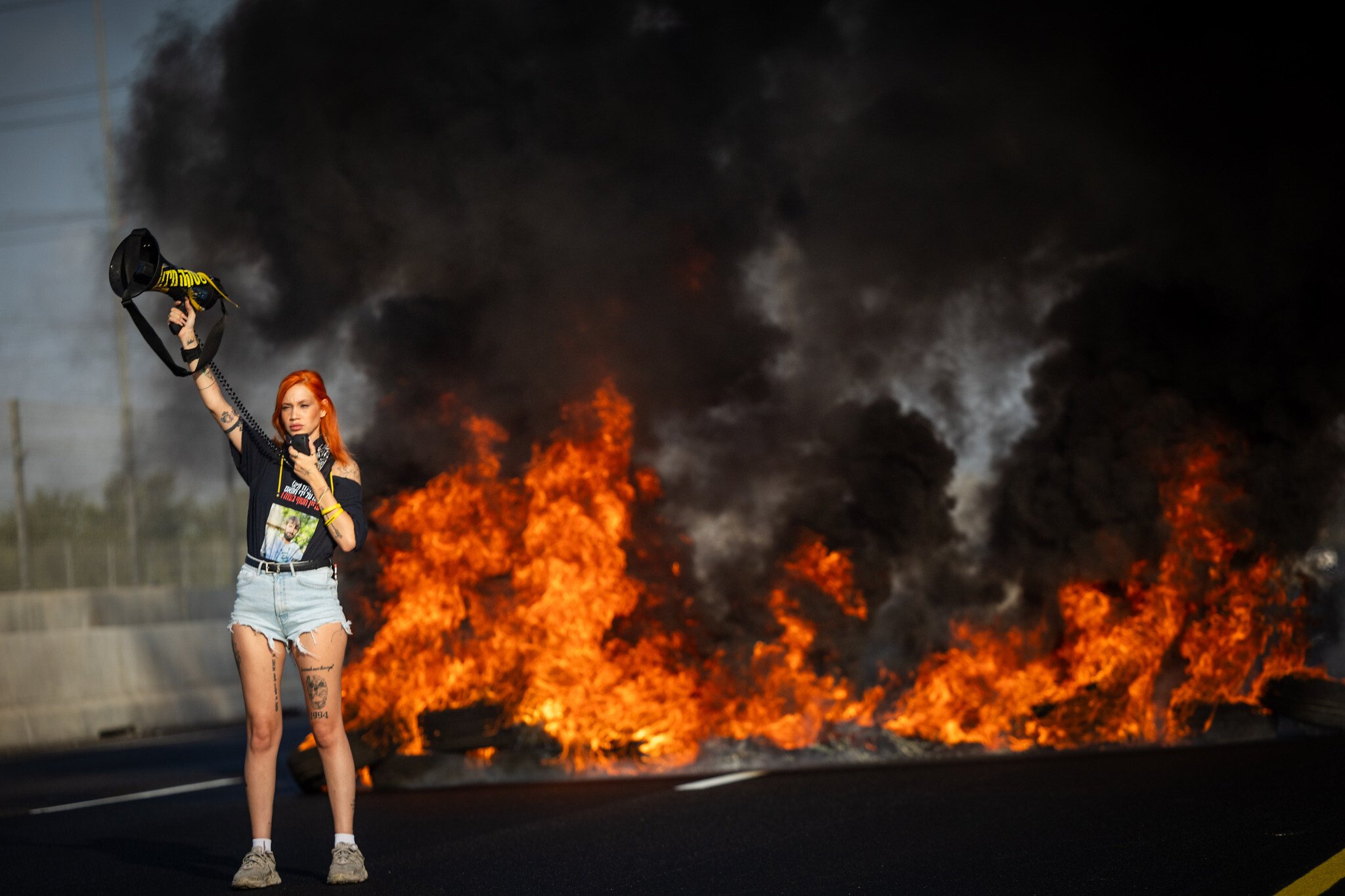
Thousands of protesters took to the streets early Tuesday, blocking highways and demonstrating outside ministers’ homes as part of an organized day of action demanding the government reach a deal for the release of 50 hostages still held by terrorist organizations in Gaza.
The day of action, announced by the Hostages and Missing Families Forum, started at 6:29 a.m. — the time that Hamas launched its attack on October 7, 2023 — with protesters unfurling Israeli flags outside the US Embassy in Tel Aviv.
Then, at 7 a.m., demonstrators moved to block several major junctions across the country, halting traffic with signs urging the return of all the captives and in, some cases, setting fire to tires on the highways.
Key roads, including Tel Aviv’s Ayalon Highway, Route 1 between Jerusalem and Tel Aviv, and the Route 2 coastal highway, were among the arteries blocked for several hours, causing widescale traffic jams across much of the country before police announced that they were once again open and traffic was flowing freely.
The police stressed that “freedom of protest and expression is not freedom to harm many others’ freedom of movement.”
“Blocking roads without permission and in a manner that may endanger road users or harm citizens’ freedom of movement will not be allowed,” the statement added.
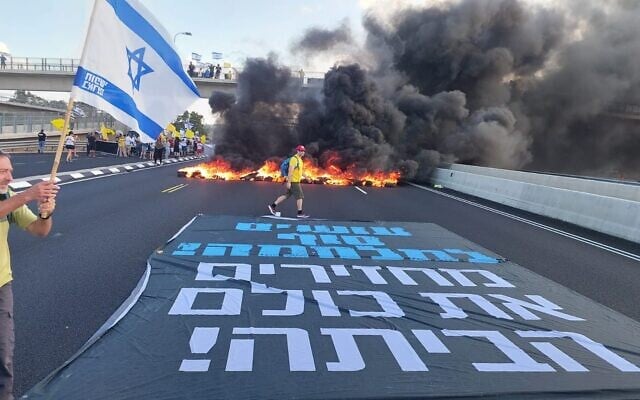
Meanwhile, relatives of the hostages gathered in Hostages Square in Tel Aviv to deliver a statement to the press.
Einav Zangauker, the mother of hostage Matan Zangauker, charged that after 690 days of war “without a clear goal,” it had become obvious that Prime Minister Benjamin Netanyahu is “afraid of one thing — public pressure.”
His government, she said, “attacked captivity survivors and the families of the hostages — all in an attempt to silence them.”
“We have a wonderful nation, but there is no government,” she said, calling for the public to join the protests on Tuesday. “Only with our strength can we bring about a comprehensive agreement and an end to the war. The government abandoned [the hostages], but the nation will bring them back!”
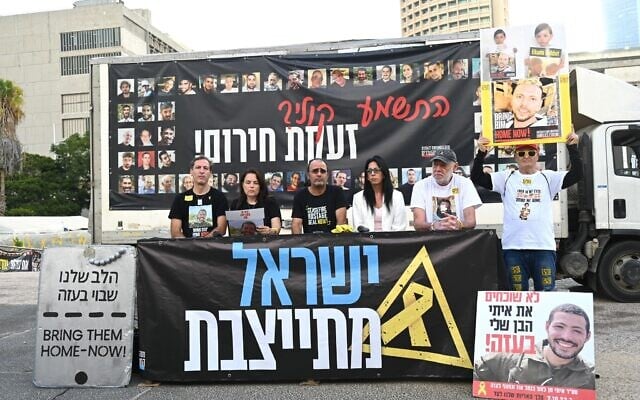
Itzik Horn, father of hostage Eitan Horn and released captive Iair Horn, accused the government of “another deliberate torpedo operation of an agreement to return hostages.”
Hamas said last week said that it had agreed to a hostage deal that would see half of the hostages released while talks kicked off to end the war and free the rest. Netanyahu has said, however, that Israel will only agree to a deal that sees all the hostages released at once, and has moved to approve plans for a military offensive aimed at conquering Gaza City.
This government “abandons its citizens… and collapses the basic moral framework of sanctity of life and mutual responsibility,” Horn said at Hostages Square.
“The progress of a plan to occupy Gaza while there is a [hostage] deal on the table for the prime minister to sign is a stab to the heart of the families and the entire nation,” he said.
Yehuda Cohen, father of hostage soldier Nimrod Cohen, referred to a previously unseen video of his son’s abduction from a tank on the Gaza border on October 7, which his family published on Monday.
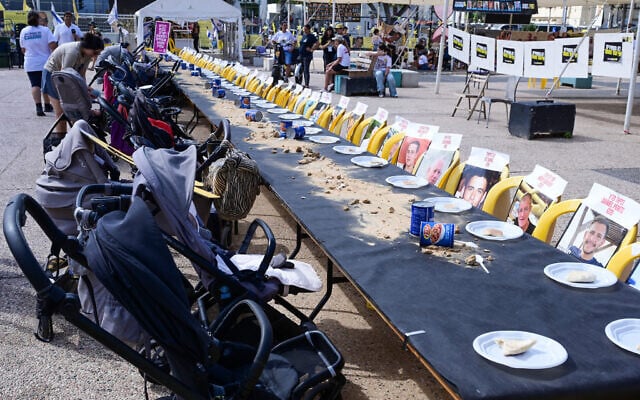
“Israel is standing up, the people of Israel are standing up for the hostages, the people of Israel are with us, and the polls show it too,” he said. “More than 80 percent want an end to the war and a hostage deal. The entire people of Israel want an end to this nightmare.”
“My son Nimrod was kidnapped from his malfunctioning tank. The videos we showed yesterday show the level of neglect from the Israeli government and the IDF.”
“Today, on the 690th day, we demand that the Israeli government make a deal and release all the hostages,” he said. “You owe it to them.”
At the center of the square stood a haunting exhibit: a long table lined with yellow chairs, each marked by the face of a hostage. Plates were set but empty. A few scraps of pita, cans of beans, and sand were scattered across the black tablecloth, evoking the starvation and inhumane conditions in captivity.
Strollers sat opposite, symbolizing the mothers who would not give up on their children. Organizers said the strollers would be replaced throughout the day by Holocaust survivors and other groups in solidarity.
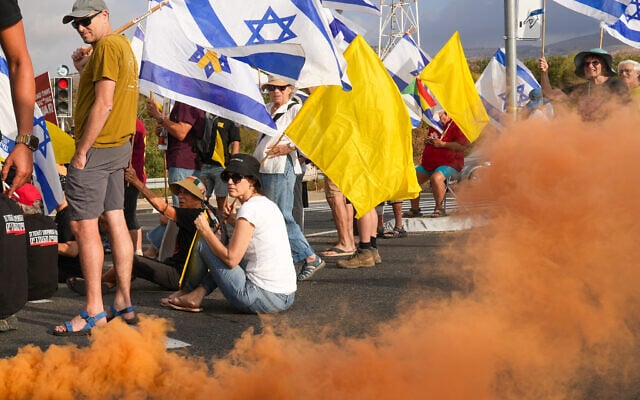
Also among those present were Kobi and Idit Ohel, whose son Alon was kidnapped from the Nova music festival on October 7 and has been held in Gaza since. He was critically wounded in his eye.
“Alon has to be returned home,” Kobi told The Times of Israel. “He’s suffering, wounded, almost two years under the worst conditions. It’s a miracle that he’s surviving.”
“He’s strong, he believes in this country, and he knows that Israel will save him,” he continued. “They have to be saved now. There’s an agreement on the table. This is the time.”
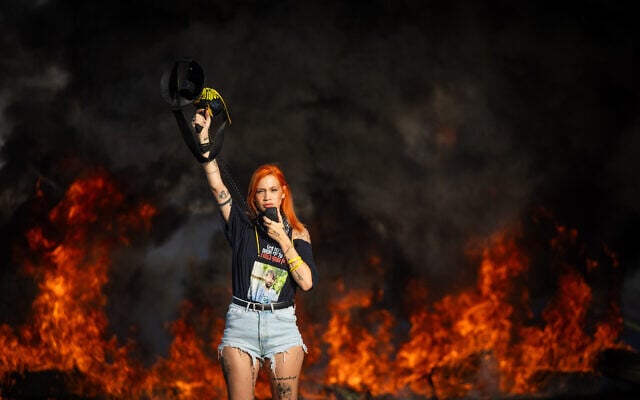
At the same time, protesters showed up outside of cabinet ministers’ homes, calling on them to support the hostage deal in a cabinet meeting on the issue that was set to take place later in the day.
In Ness Ziona, people read out the names of the hostages outside the home of Foreign Minister Gideon Sa’ar, and dozens more held banners and signs outside Education Minister Yoav Kisch’s home in Hod Hasharon.
Shai Dickmann, the cousin of slain hostage Carmel Gat, spoke to protesters through a megaphone outside the Jerusalem home of Strategic Affairs Minister Ron Dermer.
“Save them!” she yelled, as protesters responded in kind and blared foghorns.
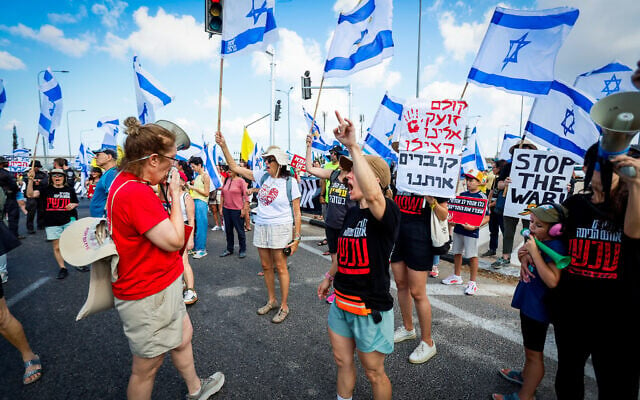
Elsewhere in the city, demonstrators blocked the crosswalk outside the home of Economy Minister Nir Barkat with long strings of hostage posters.
MK Gilad Kariv of the left-wing Democrats party called on Israelis to take to the streets, declaring that only mass protest can bring home the 50 captives still held in Gaza.
“Two hostage deals that returned 200 people to Israel only happened because of public pressure,” Kariv told the Times of Israel at Hostages Square.
“It’s true that the Biden and Trump administrations closed these deals, but without hundreds of thousands of Israelis in the streets, Netanyahu wouldn’t have even entered them.”
Kariv cited polling showing most Israelis support ending the war in exchange for a hostage deal, but argued that passive agreement was not enough.
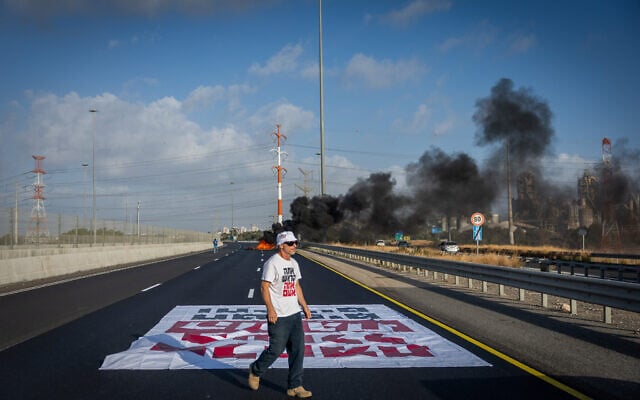
“If a million Israelis don’t take to the streets, we won’t end the war, and there will be no hostage deal. It’s really in the hands of the Israeli public,” he said.
He added that if there were enough public pressure, Netanyahu wouldn’t be able to continue the war and would have to agree to a hostage deal, despite opposition from far-right ministers Bezalel Smotrich and Itamar Ben Gvir, who have threatened to collapse Netanyahu’s coalition if he does so.
Organized demonstrations will be held in Tel Aviv throughout the day, and marches will be held nationwide from 2 p.m. onwards.
The day is set to culminate in the evening with a large march from the Savidor Train Station in Tel Aviv to Hostages Square, where a final protest will take place.
Terror groups in the Gaza Strip are holding 50 hostages, including 49 of the 251 abducted by Hamas-led terrorists on October 7, 2023. They include the bodies of at least 28 confirmed dead by the IDF. Twenty are believed to be alive and there are grave concerns for the well-being of two others, Israeli officials have said. Hamas is also holding the body of an IDF soldier killed in Gaza in 2014.
Hamas released 30 hostages — 20 Israeli civilians, five soldiers, and five Thai nationals — and the bodies of eight slain Israeli captives during a ceasefire between January and March, and one additional hostage, a dual American-Israeli citizen, in May as a “gesture” to the United States. The terror group freed 105 civilians during a weeklong truce in late November 2023, and four hostages were released before that in the early weeks of the war. In exchange, Israel has freed some 2,000 jailed Palestinian terrorists, security prisoners, and Gazan terror suspects detained during the war.
Eight hostages have been rescued from captivity by troops alive, and the bodies of 49 have also been recovered, including three mistakenly killed by the Israeli military as they tried to escape their captors, and the body of a soldier who was killed in 2014.

